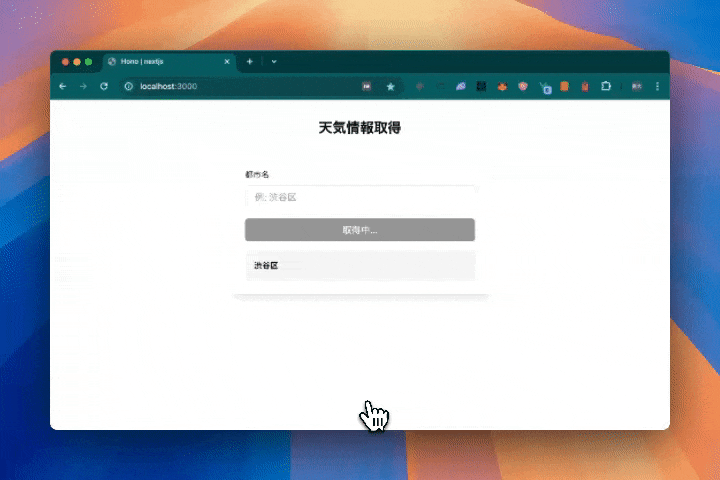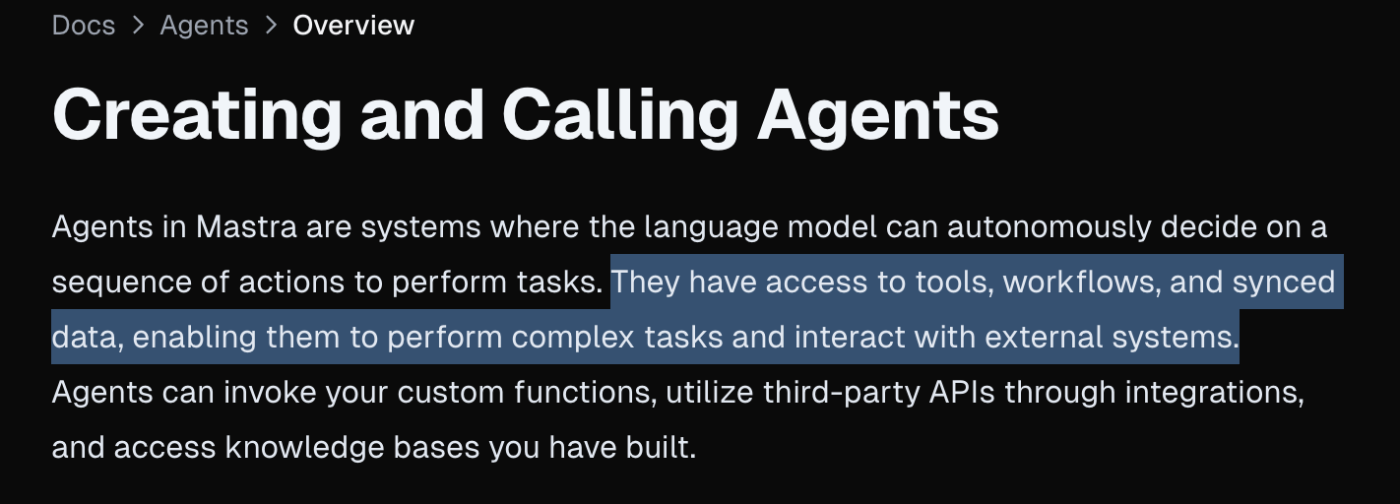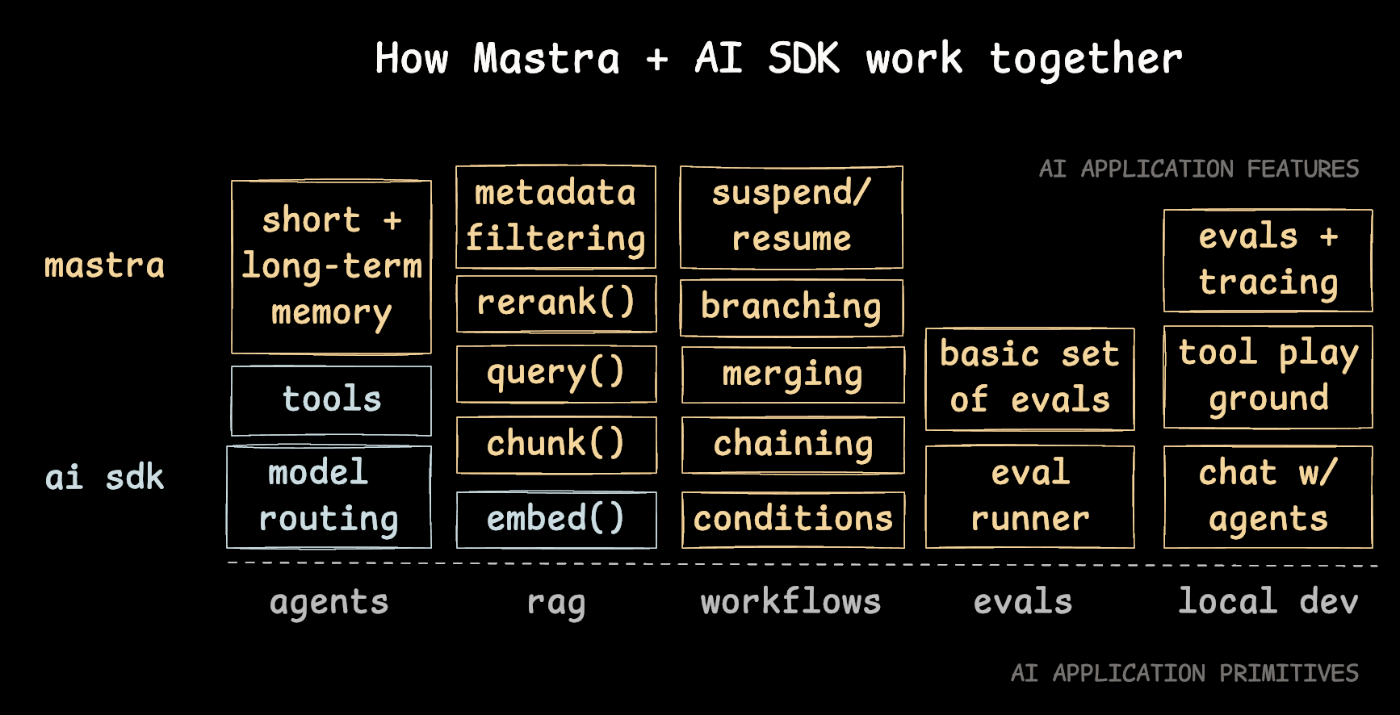mastra.ai 読解 | nextjs x hono x mastra といった構成でエージェントを作るメモ
Mastraの主要概念と依存関係を俯瞰する
基本概念
Agent
- AIエージェントの基本機能を提供
- メモリ管理とツール呼び出しを実現
- 会話履歴の保持と機能拡張を可能に
export const chefAgent = new Agent({
name: "chef-agent",
instructions:
"You are Michel, a practical and experienced home chef" +
"You help people cook with whatever ingredients they have available.",
model: openai("gpt-4o-mini"),
});
Tools
- エージェントの機能拡張を実現
- 関数呼び出し機能を提供
- カスタムツールの追加を可能に
// このツールはAgentに組み込まれる
export const stockPrices = createTool({
id: "Get Stock Price",
inputSchema: z.object({
symbol: z.string(),
}),
description: `Fetches the last day's closing stock price for a given symbol`,
execute: async ({ context: { symbol } }) => {
console.log("Using tool to fetch stock price for", symbol);
return {
symbol,
currentPrice: await getStockPrice(symbol),
};
},
});
// こんな感じに
export const stockAgent = new Agent<typeof tools>({
name: "Stock Agent",
instructions:
"You are a helpful assistant that provides current stock prices. When asked about a stock, use the stock price tool to fetch the stock price.",
model: openai("gpt-4o-mini"),
tools: {
stockPrices: tools.stockPrices, //ココ
},
});
Workflow
- グラフベースのワークフローエンジン
- LLM呼び出しを確定的な方法で実行
- 分岐や連鎖を含む制御フローを実現
myWorkflow
.step(stepA)
.then(stepB)
.then(stepD)
.after(stepA)
.step(stepC)
.then(stepE)
.after([stepD, stepE])
.step(stepF);
Memory
- 会話履歴の保持と管理を実現
- コンテキストベースの情報検索を提供
- エージェントの状態管理を実現
import { Agent } from "@mastra/core/agent";
import { openai } from "@ai-sdk/openai";
const agent = new Agent({
name: "Project Manager",
instructions:
"You are a project manager. You are responsible for managing the project and the team.",
model: openai("gpt-4o-mini"),
});
await agent.stream("When will the project be completed?", {
threadId: "project_123",
resourceId: "user_123",
});
オプショナル
RAG
- ドキュメント処理と埋め込み生成を提供
- 複数のベクトルストアを統一的に扱えるAPIを実装
- 関連チャンクの検索と知識の統合を可能に
Voice
- テキスト読み上げと音声認識を提供
- 音声対話機能を実装
- 複数の音声プロバイダーとの連携を可能に
Evals
- 出力の自動評価機能を提供
- 毒性、バイアス、関連性などの評価を実現
- カスタム評価指標の定義を可能に
MCP
- (これあるのでかいね)
- 複数のサーバーとの同時接続が可能
- 標準入出力やSSEなど、様々な通信方式をサポート
- 外部サービスとの統合を容易に実現
import { MCPConfiguration } from "@mastra/mcp";
import { Agent } from "@mastra/core/agent";
import { openai } from "@ai-sdk/openai";
const mcp = new MCPConfiguration({
servers: {
// stdio example
sequential: {
name: "sequential-thinking",
server: {
command: "npx",
args: ["-y", "@modelcontextprotocol/server-sequential-thinking"],
},
},
// SSE example
weather: {
url: new URL("http://localhost:8080/sse"),
requestInit: {
headers: {
Authorization: "Bearer your-token",
},
},
},
},
});
GUIによるObject閲覧機能が実装されている
ローカル開発環境が用意されている http://localhost:4111 で開く

agent や tools が閲覧できる。これはいい。
Sources
Mastra 単体でServe可能
Mastra uses Hono as its underlying HTTP server framework. When you build a Mastra application using mastra build, it generates a Hono-based HTTP server in the .mastra directory.
- mastra単体で単独でサーバー起動可能
- mastraサーバーにはHonoが使われている
import { Mastra } from '@mastra/core';
export const mastra = new Mastra({
// Other configuration options
serverMiddleware: [
{
handler: async (c, next) => {
// Example: Add authentication check
const authHeader = c.req.header('Authorization');
if (!authHeader) {
return new Response('Unauthorized', { status: 401 });
}
// Continue to the next middleware or route handler
await next();
},
path: '/api/*', // Optional: defaults to '/api/*' if not specified
},
{
handler: async (c, next) => {
// Example: Add request logging
console.log(`${c.req.method} ${c.req.url}`);
await next();
},
// This middleware will apply to all routes since no path is specified
}
]
});
Next.jsに統合して利用する場合
2パターンのインストールガイドがある
- NextjsをAPIサーバー単独で利用する場合 | Separate Backend Integration
- NextjsでFrontとServerどちらも同居して利用する場合 | Direct Integration
- Server Actionsで利用するパターン
- API Routesで利用するパターン
*VibesCodingの場合2がおすすめ 人間による文脈伝達がしんどいので
Source
Streamを用いたResponseが可能
LLMの回答にでてくる、文字がリアルタイムにどんどん出てくるアレに対応
const stream = await myAgent.stream([
{ role: "user", content: "Tell me a story." },
]);
console.log("Agent:");
for await (const chunk of stream.textStream) {
process.stdout.write(chunk);
}
Source
https://mastra.ai/docs/agents/00-overview#:~:text=%2C response.text)%3B-,Streaming%20responses,-For%20more%20real
AgentのInputとOutputはZod利用可能
これはWorkflowにAgentを組み込んだ時に効果を発揮するだろう
型安全にINとOUTにデータを引き渡しできる
import { z } from "zod";
// Define the Zod schema
const schema = z.object({
summary: z.string(),
keywords: z.array(z.string()),
});
// Use the schema with the agent
const response = await myAgent.generate(
[
{
role: "user",
content:
"Please provide a summary and keywords for the following text: ...",
},
],
{
output: schema,
},
);
console.log("Structured Output:", response.object);
Source
Next.jsでのStreamの実装
Server
import { mastra } from '@/src/mastra';
export async function POST(req: Request) {
const { messages } = await req.json();
const myAgent = mastra.getAgent('weatherAgent');
const stream = await myAgent.stream(messages);
return stream.toDataStreamResponse();
}
-
stream.toDataStreamResponse()によりServer-Sent Eventsにてクライアントに返却-
Content-Type: text/plain; charset=utf-8ではあるがSSEとのこと
-
SSEについては下記
Client
'use client';
import { useCompletion } from '@ai-sdk/react';
export default function Page() {
const { completion, input, handleInputChange, handleSubmit } = useCompletion({
streamProtocol: 'text',
});
return (
<form onSubmit={handleSubmit}>
<input name="prompt" value={input} onChange={handleInputChange} />
<button type="submit">Submit</button>
<div>{completion}</div>
</form>
);
}
- Vercel AI SDKの
useCompletionhookを用いることで受け取ったストリームを処理しレンダリングできる
AI SDK Streamの中身
Stream例
f:{"messageId":"msg-P55Bgxd2L54SciutpqxZSjqP"}
9:{"toolCallId":"call_kGtM9Xq70JfvkQbXmIx2QYYk","toolName":"weatherTool","args":{"location":"Tokyo"}}
a:{"toolCallId":"call_kGtM9Xq70JfvkQbXmIx2QYYk","result":{"temperature":15.1,"feelsLike":13.1,"humidity":57,"windSpeed":7.4,"windGust":29.9,"conditions":"Clear sky","location":"Tokyo"}}
e:{"finishReason":"tool-calls","usage":{"promptTokens":181,"completionTokens":15},"isContinued":false}
f:{"messageId":"msg-SWWUe7t3jajdHgOyvcuPpXJt"}
0:"The"
0:" current"
0:" weather"
0:" in"
0:" Tokyo"
0:" is"
0:" clear"
0:" with"
0:" a"
0:" temperature"
0:" of"
0:" "
0:"15"
0:"."
0:"1"
0:"°C"
0:","
0:" though"
0:" it"
0:" feels"
0:" like"
0:" "
0:"13"
0:"."
0:"1"
0:"°C"
0:"."
0:" The"
0:" humidity"
0:" is"
0:" at"
0:" "
0:"57"
0:"%,"
0:" and"
0:" there's"
0:" a"
0:" wind"
0:" speed"
0:" of"
0:" "
0:"7"
0:"."
0:"4"
0:" km"
0:"/h"
0:" with"
0:" gust"
0:"s"
0:" up"
0:" to"
0:" "
0:"29"
0:"."
0:"9"
0:" km"
0:"/h"
0:"."
e:{"finishReason":"stop","usage":{"promptTokens":246,"completionTokens":60},"isContinued":false}
d:{"finishReason":"stop","usage":{"promptTokens":427,"completionTokens":75}}
f:json
f:{"messageId":"msg-..."}
- message開始。メッセージのIDを通知。通常この後にツールコールやレスポンスが続く。
9:json
9:{"toolCallId":"call_...","toolName":"weatherTool","args":{"location":"Tokyo"}}
- ツール呼び出し開始。
- 9: は SDK 内部的に「ツール呼び出し準備ができたよ」というイベント。
a:json
a:{"toolCallId":"call_...","result":{...}}
- ツールの結果が返ってきた(たとえば、天気情報)。
- これはバックエンドでtoolNameに対応する実処理が呼ばれて返ってきたレスポンス。
e:json
e:{"finishReason":"tool-calls", ...}
- ツール呼び出しが終わったタイミング。
- finishReasonがtool-callsというのは、LLM側が「ツール呼び出しで一旦ストップしてるよ」という意味。
0: が連続してる部分
0:"The"
0:" current"
0:" weather"
- 本文ストリーミング
- チャットの返答をトークン単位(もしくは単語単位)で分割して送っている
最後の e: と d:
- e: メッセージのストリームが正常に終わったという意味(finishReason: stop)
- d: → 会話全体の終了情報(トークン数や完了理由などを含む、ラップアップ)
現在Agentが何をやっているかをリアルタイムに示したい
今どんな作業をしているかを示すと、Agenticな演出になる。
進捗状況がすぐにわかり待ち時間のストレスを軽減できる。

やりかた
Agenticに現在作業して いることを示したい場合 AI SDKの useChat() を用い、streamを受信し onToolCall を用いて現在の状況を示すといい
const { messages, input, handleInputChange, handleSubmit, isLoading } = useChat({
api: '/api/weather',
onToolCall: (toolCallPayload) => {
const toolName = toolCallPayload.toolCall.toolName
const args = toolCallPayload.toolCall.args as { location: string }
if (toolName === 'weatherTool') {
setToolStatus(`🔧 ${toolName} で${args.location}の天気を取得中...`)
} else {
setToolStatus(`🌦️ 天気情報を取得中...`)
}
},
onFinish: () => {
setToolStatus('')
},
})
onToolCallはStreamの下記のJsonが来た時のcallbackとなっている
9:{"toolCallId":"call_...","toolName":"weatherTool","args":{"location":"Tokyo"}}
Next.jsのHonoにmastraのstreamを組み込む場合
私はよくApiを、next.jsのmiddlewareにhonoを組み込んで利用している。
nextjsのapiのhonoのroutingにmastraのstream組み込みたい。
とした時に下記の様にやるとhonoの恩恵を受けながらも簡単に実現できる。
import { Hono } from 'hono'
import { mastra } from '@/server/mastra'
export const getWeather = new Hono()
const route = getWeather.post('/', async (c) => {
try {
const body = await c.req.json()
const { messages } = weatherRequestSchema.parse(body)
const agent = mastra.getAgent('weatherAgent')
const lastMessage = messages[messages.length - 1]
const city = lastMessage.content
const stream = await agent.stream(`What's the weather like in ${city}?`)
// ここがhonoを介したstreamの実装
return c.newResponse(stream.toDataStreamResponse().body, {
headers: {
'Content-Type': 'text/event-stream',
'Cache-Control': 'no-cache',
Connection: 'keep-alive',
},
})
} catch (error) {
console.error('API Error:', error)
return c.json(
{
error: {
message: '天気情報の取得に失敗しました',
details: error instanceof Error ? error.message : undefined,
},
},
500,
)
}
})
export type GetWeatherRoute = typeof route
もともと stream.toDataStreamResponse() でstreamは提供されているので、
honoが提供する streamSSE は用いず、newResponse にてresponseを作成する。
honoの c(Context) も維持される。
mastraが利用するAI SDKでもおそらく同じ実装でいけるはず。
mastra devサーバーを起動

pnpm mastra dev -d server/mastra
ディレクトリは -d で指定可能 デフォルトは src/mastra
デバッグツールでは対話型でテスト可能
デバッグツールで、作ったagentと対話型で実行チェックできる

Agentからworkflowは呼び出せるのか?
workflowがagentを呼び出す、という構造だと思っていたが、agentがworkflowを呼び出すといったこともできるっぽい? 現在調べている。少なくともagentの引数でworkflowは取れないが、tool内部で呼び出すことは可能か調べている。

toolとしてworkflowを定義し、agentでtoolを使えば良い模様。
import { createTool } from '@mastra/core'
import { z } from 'zod'
import { mastra } from '..'
export const sourcingTool = createTool({
id: 'search-tool',
description: '検索する',
inputSchema: z.object({
input: z.string().describe('検索ワード'),
}),
outputSchema: z.string(),
execute: async ({ context }) => {
const sourcingWorkflow = mastra.getWorkflow('searchWorkflow')
const run = sourcingWorkflow.createRun()
await run.start({
triggerData: {
input: context.input,
},
})
return 'success'
},
})
中断での対話式のワークフロー
suspend() を入れることにより一時中断し、ユーザーにパラメータの再入力を求めることができる
console.log('Low confidence in generated content, suspending for human guidance', { guidance })
// If confidence is low, suspend for human guidance
if (!guidance) {
// only suspend if no guidance is provided
await suspend()
return undefined
}
https://mastra.ai/examples/workflows/suspend-and-resume
